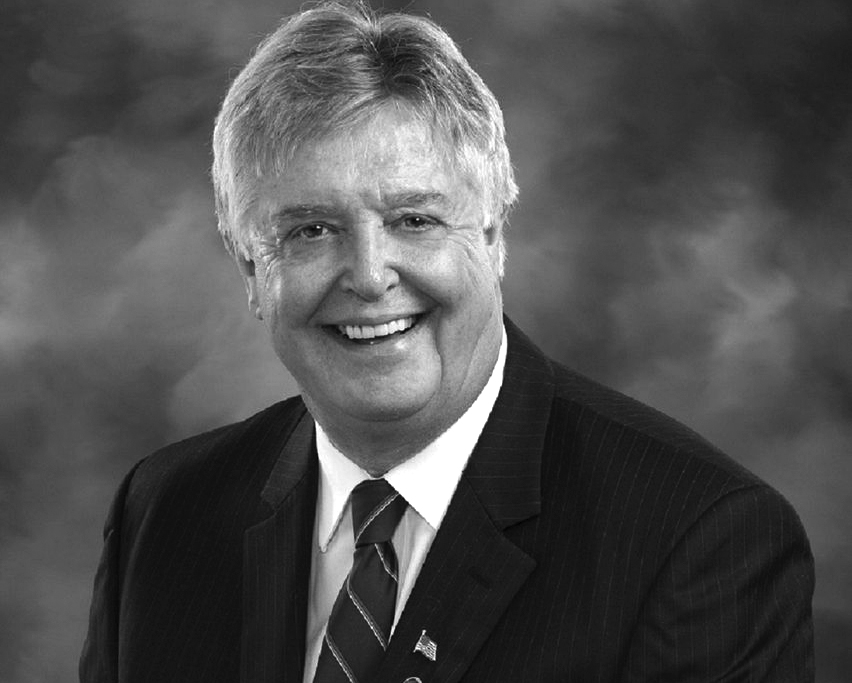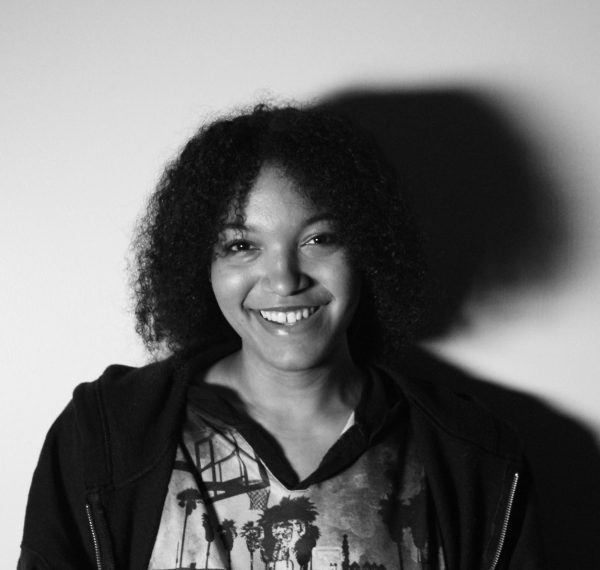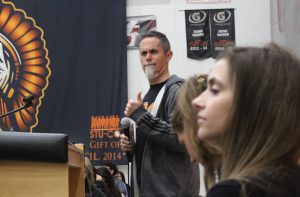Meet Steven Reick, the Republican running for Illinois State Representative
Rep. Steven Reick talks abortion, proudest accomplishments and Trump ahead of the Nov. 8 election
Steve Reick
Steve Reick, representative of the 63rd district in the Illinois House of Representatives, is a Republican running for re-election during the 2022 primaries.
November 4, 2022
Steven Reick is a current Illinois State Representative for District 63. He is running for his fourth term against against Democrat Brian Meyers.
Can you tell me a little bit about yourself?
As you probably know, I’m Illinois’ Representative for the 63rd District here in McHenry County. My background is that I’m a lawyer; I was a tax lawyer for over 40 years. I’ve retired and I’m a full-time legislator now here in McHenry County. I’m running for reelection for my fourth term. I first took office in 2017.
When you were the oldest incoming representative, did that give you an advantage?
I like to think it did. I like to think that having all of the years of life experience and having grown up here in Illinois gives me an idea a little bit more of what the state is all about. Having a bunch of years of experience dealing with taxes and things like that gave me a good leg up in terms of any issues that I was going to confront when I got down to Springfield.
Are you in touch with the community that you’ve been in for so long?
I’m not out pounding doors every day and stuff like that, but my constituents know where to get a hold of me. I have a very responsive legislative office here in Woodstock. We deal with a lot of constituent matters in my office. I’d rather think that my constituents get to know me through service rather than me being everywhere and all that kind of stuff. I like to think that most people do not lead political lives. They don’t make decisions based upon political determinations. My job is to make it easier for them to live their lives without interference by the state or government as a whole.
What are some of the bills you sponsor?
I’m focusing mostly these days on reforming the Department of Children and Family Services. It’s a kind of heavy lift because DCFS is an aid that needs a lot of reform; we’ve got kids falling through the cracks all over the place.
I proposed legislation to give a refundable property tax credit for low-income seniors. You can go to my website, I’m kind of proud of it. You’ll see a list of some of my more major bills that I’ve introduced, and there’s a link to all the bills that I’ve introduced since I got in the house. I’m focusing mostly on DCFS reform and doing things with our tax and pension systems.
What steps have you taken to achieve those goals?
I told you about the tax credit for low-income seniors on the Illinois property taxes. The problem with dealing with pensions here in Illinois is that the state is under a strict hold of the public sector unions that won’t allow any kind of change to our pension system. Ultimately, it’s going to result in pension systems probably going broke. Or at least not being in anywhere near stability during.
I’ve worked with people on both sides of the aisle. Education is important. I’m working with one of my Democrats on extending the ending date on the private school scholarship program.
Again, if you go to my website, you’ll see a link to a blog where there’s a lot of things on different categories of things dealing with tax reform, pensions and schools — that sort of thing. You get a bunch of deeper ideas of what I think is important.
What would you consider your proudest accomplishment as a legislator?
A couple years ago, we had a bill that came over from the Senate that provided for a gun violence restraining order. That was extreme and it was extremely disruptive of individual liberty. I saw that bill, I went over to the Democrat who was the House sponsor of that Senate Bill and told her that it had to be changed.
What we did over the period of a couple months was redraw the bill to provide for families to be able to avail themselves of a gun violence restraining order and to take firearms out of the people who are showing all the signs of being uncivil and possibly committing violence.
I basically drafted that bill, however, I wasn’t the main sponsor of it because it had to be run by who was in charge. She was very good at telling her people that these were good changes and we got them done.
Ultimately, it was passed and signed into law by the Governor and it is a tool that’s available to families today, and if they only took more advantage of it, we might end up with fewer mass shootings. These shooters show signs, and if you know that, you have the tool available to make sure that you keep firearms out of their hands until they get the help they need.
Also, a hearing that I did, part of that dealt with sexual abuse in public schools by teachers and school employees. So I’ve got a wide range of interests, but I’m currently dealing with DCFS and tax pensions.
What are your thoughts on current government spending and taxation?
First of all, I was a tax lawyer for 4 years. I think that Illinois’ pro-taxing system is out of whack or out of touch with where it ought to be because you [want a tax] system that follows the economy and allows the growth in the economy to increase your tax base.
I’ve long been an advocate of replacing the income tax with the state sales tax, because I believe that taxing income depresses job creation and things like that. Our current tax system that was drafted and made at a time when Illinois had a different economy than it has today. We need to change the tax structure to aid the economy as it is.
I think that our failure to pay back the money that we owe the federal government … is governmental malpractice on the part of the governor and his people. We put out a lot of mandates on local school districts that weren’t willing to pay for [those] at the state level; we’re telling them to do things and not giving them the money to do it.
Those are things that can be done at the state level, I think, to help mitigate the economic problems that we have, and we do have economic problems. I mean, we’re living in a sugar rush now of all that from the federal government during COVID. But, that money is going away and sooner or later reality is going to set in. We’re going to figure out that we passed bills to spend money that we no longer have.
What are your thoughts on Roe v. Wade being overturned?
I am happy that Roe v. Wade was overturned. I am completely in support of the Dobbs decision, but you must read the dobbs decision in order to find out exactly what it says.
The dobbs decision did nothing more than put the conversation on where abortion should be back in the states and the hands of the voters. I started law school three years after Roe vs. Wade was decided. And so I’ve been dealing with this issue for a long time. Had we allowed states to have that conversation 50-60 years ago and not shortcut and not short circuited it with the Supreme Court decision that put everything in place, and made no changes, we’d be a much happier society right now.
Dobbs isn’t a decision of abortion, its a decision that discusses the very fundamentals of Federalism here in the United States — putting this decision back in the hands of voters, back in the hands of the states and their legislatures to determine what boundaries should be placed upon abortion. And I think that’s the proper place for it to be.
The Illinois Supreme Court is going to have nothing to say about what happened with Roe v. Wade because Dobbs does not overturn Illinois law. The question is what are the voters going to do in the coming years to say? [Have] we have gone too far and we’re going to scale this back to something that is reasonable?
That will move us away from having abortions right up to the moment of birth. And something that’s much more reasonable and much more acceptable to the majority of the people where I think most people are in this state.
That’s my take on Dobbs, but you got to read that. You gotta read it for what it is.
Do you believe abortion is healthcare?
No, I don’t believe abortion is healthcare. I do not. Abortion takes a life, there’s no question about it. The fact is that abortion is not healthcare. Abortion is a decision based upon that whose sole purpose is to terminate a life, because I believe that life begins at conception.
I’m willing to compromise as a legislator to the extent to which that can be enshrined into law — and I’m willing to compromise, but I’m not going to call it healthcare for the sake of a decision based upon something other than affecting literally the life of the mother or comes from rape or incest. Sure, I don’t have a problem with those exceptions. But the thing is, if it’s a decision made because you don’t want a child and you can’t afford it, that’s not healthcare.
Why should we have you as a representative?
First of all, I’ve been there for three terms and, say what you want about term limits and all that kind of thing. There’s a lot to be said for somebody who’s been there long enough to know how the process works and working with relationships that have been established over those last three year terms.
Second of all, I’ve risen to the point where now I’m the minority spokesperson of the Revenue Committee, the Labor Committee and I’m also a member of the Joint Committee on Administrative Rules, which you may have read something about. What JCAR and these committees do is give me and, by virtue of being me, it gives the people of McHenry a much broader voice in what goes on in those very important discussions both in revenue and labor.
The fact that you got a representative who has been there and understands the issues at a much greater level than somebody who will come in, and it’s to be expected when you’re a new legislator, you don’t understand all of what’s going on. But you learn that over time. And by doing away with that institutional knowledge your constituents are not well represented. You know, if the people want somebody different, they’re fully within their rights to choose somebody else. That’s fine. But the fact is, what I’m doing is giving the people in McHenry County a bigger voice in Springfield, because of those committees and my relationship that I built up with my Democratic colleagues.
How do you work with Democrats, seeing that you’re a Republican?
It depends on a particular issue. I told you earlier I worked very closely with one of my Democratic colleagues on extending the Sunset, or the educational scholarship bill that we passed back in 2019. He’s a black guy from the South side of Chicago and he and I are joined at the hip on this issue. We are working like dogs to make sure that Sunset gets extended in that program. You don’t look at every issue and say, “Well, you’re a Democrat, and I’m not going to support you.”
The gun violence restraining order is another example. I didn’t go and scream and yell on the floor; I went to the sponsor of the bill who was a Democrat and said, “We’ve got to change this. This is not going to be a good bill,” and she knew it. She welcomed my input. And what resulted from it was a pretty darn good bill.
So, that’s how you do it. You can’t afford to alienate people on the other side of the aisle, you’re not going to get anything done. What I want to do with DCFS has got broad bipartisan support because everybody has a problem in their own district dealing with child welfare. So me being there, and knowing that I’m honest about what I’m trying to do, and I’m not going to try and pull the rug up at the last moment; that means something because you can finally get something substantial done.
So, you’re just focused on working together with both parties?
Here’s the deal, once Edmund Burke was elected as member of the House back in the 1700s, told his constituents in his particular district that, “Yes, I represent you. You elected me to represent you in Parliament. But I’m also a member of Parliament, which means I have a responsibility to think of the best interests of the country as a whole.”
I feel the same way about the state of Illinois. Once I got elected, that label has got to be shed in order for me to do the best I can for both my district and for this state. And I truly believe that. It’s fundamental to what [we] should be doing in Springfield and towards the next election. So you have to shed that label. And the thing is, everybody complains about, “Well, we don’t want insiders, we don’t want insiders to do this..”
Here’s the deal, when you get elected there are what, 12 million people in the state? There are 118 of us in the Illinois House of Representatives; we are by definition insiders.
Do you believe Donald Trump had good policies and that he should run again?
Some of the things, like the Supreme Court justices that were elevated during his term, I’m very pleased about. We weren’t on the brink of nuclear war when Trump was president. Inflation because of the pandemic, it wasn’t anybody’s fault, but it comes about because of a lot of things that had to do with politics. It has been made worse through the policy of the current Administration.
Should Trump run again? Frankly, no. I think he’s intellectually or emotionally unfit to be President of the United States. But that’s going to be his decision, and actually, what he does and what his success is, as far as getting nominated in 2024, will go a long way towards determining whether I decide to run again.
I don’t want to face the headwinds that will blow in the face of whatever comes out of Washington because more of what happens that affects your life happens in Springfield than Washington.
Washington gets all the press and all the headlines, but the real work that gets done affecting your life happens in places like Springfield and the Kent State capitals throughout the country. It happens there. We have more to say about what your life is going to be like than anything that comes out of Washington.











